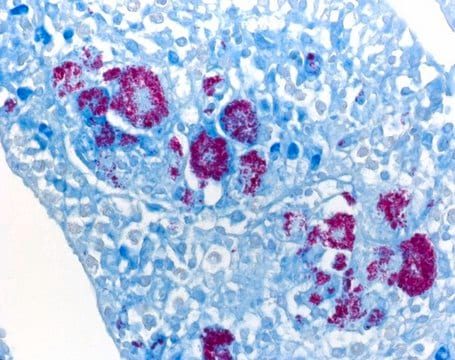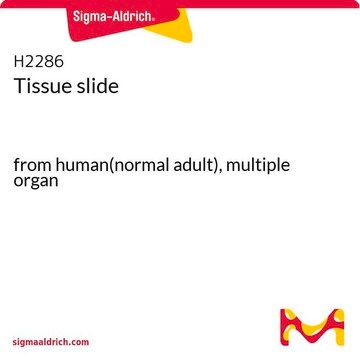TTR002
Amyloid TISSUE-TROL™ Control Slides
from human heart
Sign Into View Organizational & Contract Pricing
All Photos(1)
About This Item
UNSPSC Code:
41116121
NACRES:
NA.47
Recommended Products
biological source
human heart
application(s)
hematology
histology
storage temp.
room temp
General description
Amyloid TISSUE-TROL™ Control Slides are histology slides embedded with human heart tissue. The embedded heart tissue is embedded in paraffin and contains Amyloid proteins. The product comes with one reference slide stained using Congo Red (amyloid stain). Historically, amyloids have been described as fibrillar protein deposits often associated with a disease. Disease caused by amyloids are referred to as “amyloidosis”.
Application
Amyloid TISSUE-TROL™ Control Slides is used as a positive control to study pancreatic inflammation.
Components
Box contains 24 unstained slides plus one reference slide stained using Amyloid Stain, Congo Red (Procedure No. HT60).
Legal Information
TISSUE-TROL is a trademark of Sigma-Aldrich Co. LLC
Storage Class Code
11 - Combustible Solids
WGK
WGK 3
Flash Point(F)
Not applicable
Flash Point(C)
Not applicable
Certificates of Analysis (COA)
Search for Certificates of Analysis (COA) by entering the products Lot/Batch Number. Lot and Batch Numbers can be found on a product’s label following the words ‘Lot’ or ‘Batch’.
Already Own This Product?
Find documentation for the products that you have recently purchased in the Document Library.
Customers Also Viewed
Pancreatic inflammation and increased islet macrophages in insulin resistant juvenile primates.
Nicol L, et al.
The Journal of Endocrinology, JOE-J12 (2013)
J C Rochet et al.
Current opinion in structural biology, 10(1), 60-68 (2000-02-19)
Recent progress has improved our knowledge of how proteins form amyloid fibrils. Both 'natively unfolded' and globular proteins have been shown to initiate fibrillization by adopting a partially structured conformation. Oligomeric prefibrillar intermediates have been extensively characterized with respect to
L E Nicol et al.
The Journal of endocrinology, 217(2), 207-213 (2013-02-20)
Chronic high caloric intake has contributed to the increased prevalence of pediatric obesity and related morbidities. Most overweight or obese children, however, do not present with frank metabolic disease but rather insulin resistance or subclinical precursors. The innate immune system
Our team of scientists has experience in all areas of research including Life Science, Material Science, Chemical Synthesis, Chromatography, Analytical and many others.
Contact Technical Service














